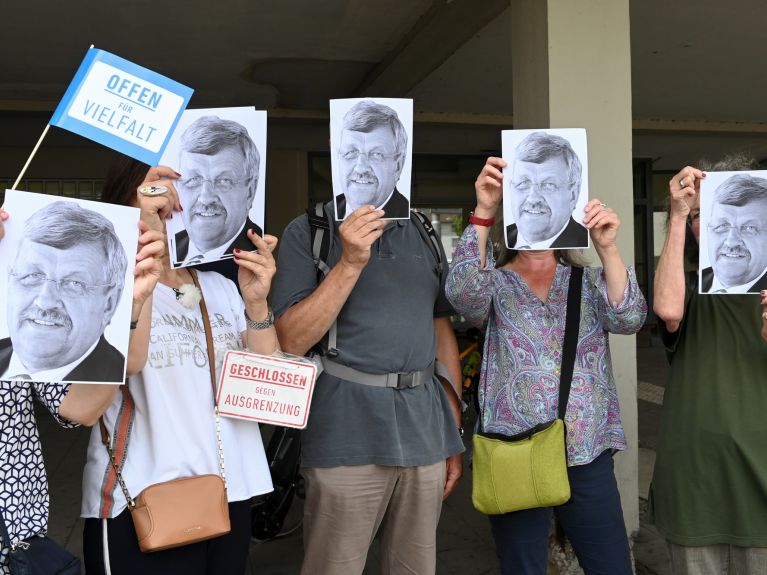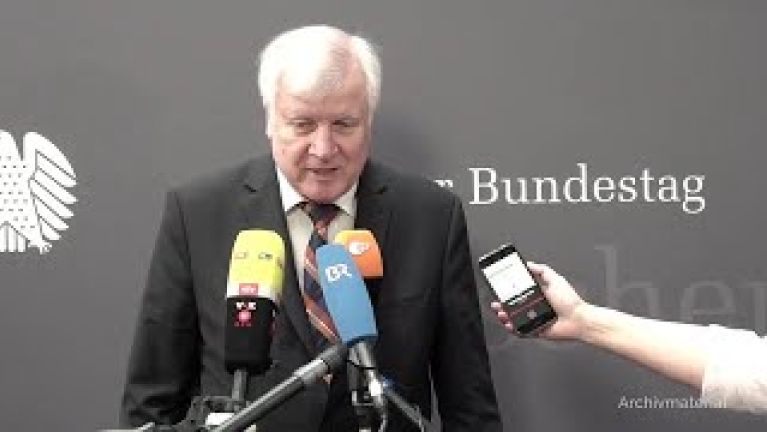Targeting tolerance
After the political murder committed by a far-right radical: Is far-right terrorism on the rise in Germany?

It was after midnight, but Walter Lübcke, 65, was still sitting on the terrace of his house in Wolfhagen-Istha, a small town near Frankfurt. The local politician, a member of Chancellor Angela Merkel’s CDU, lit a cigarette. He could probably still hear the music from the party tent at a nearby carnival when the bullet hit – fired at short range, from a 9mm pistol, into the side of his head.
The killing has shocked the entire country
It was a political murder committed by a far-right radical, it now seems. The killing has shocked the entire country. German President Frank-Walter Steinmeier has commented on the case, as has Merkel. It was an “attack on us all,” one with completely new characteristics, said Interior Minister Horst Seehofer.
Dieses YouTube-Video kann in einem neuen Tab abgespielt werden
YouTube öffnenThird party content
We use YouTube to embed content that may collect data about your activity. Please review the details and accept the service to see this content.
Open consent formOn that night of June 1, a bout of violence erupted that had been building noticeably for years in much of the country, the investigation suggests. In 2015, as Germany was taking in 10,000 Middle Eastern refugees each day, sometimes more, and criticism of the policy was growing steadily, Lübcke took a clear stance.
“Everyone is free to leave this country”
A town meeting was called to discuss plans for a new asylum shelter in the area. Lübcke regarded the acceptance and sheltering of people in need as a necessity, a Christian duty. Supporters of the anti-migrant Pegida movement, who were also in the room, had a different opinion. Lübcke took to the stage to address them: “Anyone who does not share these values is free to leave this country at any time.”
Ever since that Oct. 14, 2015, the statement can be found online. Pegida supporters immediately uploaded a video of it on YouTube, creating a basin to collect all the hate and incitement against Lübcke. If, perhaps, this remark was the reason for his killing, what does that mean for Germany?
The worst fear came true
For security authorities, the crime was their worst fear come true. The threat posed by violent, extremist right-wing offenders and terrorists has been growing for years. The number of potential violent offenders keeps rising. Police and surveillance authorities are beefing up their own efforts; but apparently the threat is growing too fast for them to keep up.
DNA analysis at the scene led investigators to a man who’s now the chief suspect. The key bit of evidence was a single flake of skin on Walter Lübcke’s checkered shirt. Computers delivered a definitive ID: a man named Stephan E., born in 1973. At about two in the morning on June 15, a police SWAT team arrested Stephan E. at his home, not far from Walter Lübcke’s house.
The case has many parallels
Investigators are still uncovering the full scope of the crime. The suspect confessed, leading to the discovery of the murder weapon and a cache of other firearms, including an Uzi submachine gun. On July 2, however, he recanted his confession. But many questions remain. Why did Stephan E. choose Lübcke as his victim?
Besides a political motivation, could personal reasons have also played a role? Why would a right-wing extremist, whose most recent offense was back in 2010, allegedly kill someone now? The case has many parallels to an October 2015 knife attack on Henriette Reker, then a mayoral candidate in Cologne, who was stabbed by a rightwing extremist named Frank S. Like Lübcke, Reker had authority at the municipal level for accommodating refugees.
Reker survived the attack on her life
According to police records, the extremism of Reker’s assailant, who was sentenced to 14 years in prison for the attack, had been dormant for nearly two decades before he drew his knife. It’s believed the refugee influx in 2015 reactivated his xenophobia. Unlike Lübcke, Reker survived the attack on her life. She is now the mayor of Cologne.
Henriette Reker and Walter Lübcke share another trait, one that is now raising fears among other local politicians. Lübcke headed a municipal authority and was known to be easily accessible – a man of the people. Unlike many local and federal politicians, such as state interior ministers and many members of the federal government, these local leaders do not have constant police protection. They are easy targets.
Read the whole text on The German Times website
Ronen Steinke is an editor at Süddeutsche Zeitung.
